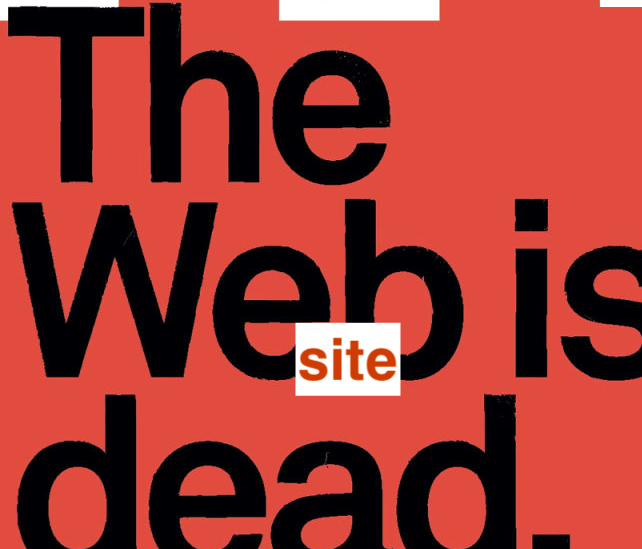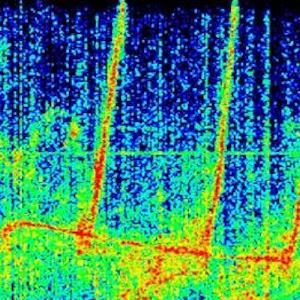Rarely does a PHD student become a pop-icon. This is the story of John Maus, the post-modern scholar, singer, synth-lover and producer, hitting away against the din and clatter of industrial pop. Radical and provocative, wayward and intelligent, and a far-cry from industry approved pop heroes and divas. Audibly influenced by 80's aesthetics - Of new-wave punk, synth-wave and electro-clash, John Maus has come a long way from his days as an outspoken scholar to somewhat of an anti-pop hero, for thousands of millennials. Yet never any less disenchanted by contemporary culture and society. Maus has been compared to the proverbial "village idiot" - to a "sacred prophet" - a "coming of jesus in pop" and even a "shaman". The archaic christian labels aside, what makes him interesting is not what seems to be obvious. The overall narrative of his music is a reflection of a decaying society, the folly within dancing on it's way out. Maus is most often talking about the "lack of meaning". Someone, with a fair amount of hindsight did say "The 80's marked the end of history... everything will remain as is, in the future". The confluence of 80's nostalgia, critical theory, bits of hauntology, a DIY spirit and deeply introspective lyrics creates the significance (and impact) of John Maus's music. Songs for the big end?
"We Must Become The Pitiless Censors Of Ourselves".
Post-pop, like many facets of post-modern culture is an interesting place to look and listen, for the emerging narratives and hybrid (often confusing) aesthetics. Mainstream pop music stories are mostly about make-believe, fantasy, heterosexual love, a-better-world-tomorrow and such. Superstars like Justin Timberlake, Bjork, Bono, Thom Yorke, Adele, Rihana and such (pardon the genre over-sweep) are in essence big (narcissistic) icons thriving on idol worship. Lest we forget that mass culture serves the industry and vice verse, however along this endless continuum, sometimes exceptions occur and inspire. "Outrageous beliefs and values are taken for granted today by society. The screen is the opiate, full of horrific spectacles, made to avoid the real horror. My message is not so political, nor about creating sensationalism, but I do know my ethics lie somewhere between punk, procedure and DIY" states Maus in an interview with a group called Kolektiv Smetnjak. His album 'We Must Become The Pitiless Censors Of Ourselves' (released 2011) resonated with many living in East-Europe, Russia and Germany. "Back in 2003, I was producing a new song every month. But that's not prolific at all... Not when we see guys smoking a lot of dope and making so many tunes, sounds and beats" states Maus, as he discards the 'prolific' label, in-spite having released 10 albums and several singles in the last 20 odd years. "What some artist is doing in his or her little white room is emancipated. Is celebrated in magazines, TV and on youtube... To be finally hung up in an art gallery? Well, thats ridiculous off course, when you can watch an ugly metal skeleton bursting into flames signalling the end of humanity (referring to the movie Terminator)" states Maus when asked about the ruling cultural aesthetics of the day.
John Maus is often considered a progenitor of the hypnagogic pop sound, a genre rooted in memory and nostalgia {Hauntologic value} Many of his compositions use particular modal structures previously associated with Renaissance and Medieval music, which he believes is often "mistaken as an attempt to evoke the 1980s". The sound however is a 'Post-Roxy-Music meets Renaissance revivalism'. Swirling and sweeping, a lofty post-disco mix of ditty machine beats, arpeggios, minimal baselines riding along his voice(s); sometimes evocative and dark (like David Bowie) and sometimes dead-pan (like The Talking Heads).
Hauntology (a word-play between haunting and ontology) is a concept coined by philosopher Jacques Derrida. Earlier this year we published an article about Hauntology and how the theory manifests in various genres of electronic music and the industry within. Derrida explains the concept as "living as a figure of a ghost, which is neither present, nor absent, neither dead nor alive." Two decades later the theory lingers on, manifesting itself inside popular culture, in genres of music, art, video games and emerging digital technology. John Maus too is a part of the 'haunted' narrative of post-pop. Roxy Music, polyphonic synthesizers, automation, digital reverb, fast cars, blonde models, cocaine, picture perfect sunsets and a stunning highway into the future - however grandiose (and ludicrous) this 'returning narrative' of the 80's, it made a deep psychological impression on millions and millions growing up in the post-modern world. The outcome of which is heard and seen today. The aesthetics of the past crashing into the uncertainty of the future, witnessed by the present moment floating in the middle. What appears rather dull, predictable and even negative in mainstream pop, can be heckled and even ripped apart, by positive feedback created by emerging artists. "I do feel that contemporary music should be placed in 'constellation' next to reality. Lets be objective and not romanticise about the person or the process... Don't feed speculation and icon worship... It sounds like this, it sounds like that... We are not children to depend on experts. Try to see what is not reducible.. What doesn't make sense... Tell me what is strange about it? A thumbs up or thumbs down says nothing... is just like being a stupid bureaucrat..." pours out Maus when asked about pop music appreciation. His 338-page thesis titled "Communication and Control" examines the influence of technology on control societies.
Post-Screen Trauma!
"I did try going into sensory deprivation tanks and just trying any trick I could think of. I became solely obsessed with this at the expense of anything else." According to Maus in 2010, he had been diagnosed "with everything at one point or another. They say you’re bipolar or whatever, but I've never had one of those ... euphoric, manic episodes where I had an exaggerated perception of my own ability, that would be wonderful. But no, I guess depression, or stuff like that." When asked if he had autism, he responded: "No, no, no, I don't put much stock in those clinical categorisations in general, I suppose... those idiotic doctors do..." Looking back between 2011 till 2016, Maus entered a long period of self-imposed isolation, involved in building basic synthesizers, learning modular synths, searching for new directions and many things hedonistic. John Maus denies any deliberate pursuit as a careerist, and also as a person who desires 'Purification of Pop' (His song Don't be a Body). Deeply inspired by philosophers like Adorno, Derrida, Jacques Lacan, Deleuze / Guattari and Slavo Zizek, he is careful to define or label music and art. "Reject Praxis!" He says with a smile. Recently someone asked John Maus "What if your were lady Gaga?". His response was "I don't want to be dialectical and say negative things... My point being, that we are all 'Lady Gaga' or for that matter we are all 'Zizek' or what-you-want... It's us having a conversation about them. As long as we listen to each other and not worship an icon placed on a stage... Maybe it's totally naive to say that, and a lame cop-out. It's you, me, those people who we don't know, those who appear despicable, all those who want to interact and get around... Everybody has got a spirit, got ideas and some innate philosophy..."
"We Must Become The Pitiless Censors Of Ourselves".
Post-pop, like many facets of post-modern culture is an interesting place to look and listen, for the emerging narratives and hybrid (often confusing) aesthetics. Mainstream pop music stories are mostly about make-believe, fantasy, heterosexual love, a-better-world-tomorrow and such. Superstars like Justin Timberlake, Bjork, Bono, Thom Yorke, Adele, Rihana and such (pardon the genre over-sweep) are in essence big (narcissistic) icons thriving on idol worship. Lest we forget that mass culture serves the industry and vice verse, however along this endless continuum, sometimes exceptions occur and inspire. "Outrageous beliefs and values are taken for granted today by society. The screen is the opiate, full of horrific spectacles, made to avoid the real horror. My message is not so political, nor about creating sensationalism, but I do know my ethics lie somewhere between punk, procedure and DIY" states Maus in an interview with a group called Kolektiv Smetnjak. His album 'We Must Become The Pitiless Censors Of Ourselves' (released 2011) resonated with many living in East-Europe, Russia and Germany. "Back in 2003, I was producing a new song every month. But that's not prolific at all... Not when we see guys smoking a lot of dope and making so many tunes, sounds and beats" states Maus, as he discards the 'prolific' label, in-spite having released 10 albums and several singles in the last 20 odd years. "What some artist is doing in his or her little white room is emancipated. Is celebrated in magazines, TV and on youtube... To be finally hung up in an art gallery? Well, thats ridiculous off course, when you can watch an ugly metal skeleton bursting into flames signalling the end of humanity (referring to the movie Terminator)" states Maus when asked about the ruling cultural aesthetics of the day.
John Maus is often considered a progenitor of the hypnagogic pop sound, a genre rooted in memory and nostalgia {Hauntologic value} Many of his compositions use particular modal structures previously associated with Renaissance and Medieval music, which he believes is often "mistaken as an attempt to evoke the 1980s". The sound however is a 'Post-Roxy-Music meets Renaissance revivalism'. Swirling and sweeping, a lofty post-disco mix of ditty machine beats, arpeggios, minimal baselines riding along his voice(s); sometimes evocative and dark (like David Bowie) and sometimes dead-pan (like The Talking Heads).
Post-Screen Trauma!
"I did try going into sensory deprivation tanks and just trying any trick I could think of. I became solely obsessed with this at the expense of anything else." According to Maus in 2010, he had been diagnosed "with everything at one point or another. They say you’re bipolar or whatever, but I've never had one of those ... euphoric, manic episodes where I had an exaggerated perception of my own ability, that would be wonderful. But no, I guess depression, or stuff like that." When asked if he had autism, he responded: "No, no, no, I don't put much stock in those clinical categorisations in general, I suppose... those idiotic doctors do..." Looking back between 2011 till 2016, Maus entered a long period of self-imposed isolation, involved in building basic synthesizers, learning modular synths, searching for new directions and many things hedonistic. John Maus denies any deliberate pursuit as a careerist, and also as a person who desires 'Purification of Pop' (His song Don't be a Body). Deeply inspired by philosophers like Adorno, Derrida, Jacques Lacan, Deleuze / Guattari and Slavo Zizek, he is careful to define or label music and art. "Reject Praxis!" He says with a smile. Recently someone asked John Maus "What if your were lady Gaga?". His response was "I don't want to be dialectical and say negative things... My point being, that we are all 'Lady Gaga' or for that matter we are all 'Zizek' or what-you-want... It's us having a conversation about them. As long as we listen to each other and not worship an icon placed on a stage... Maybe it's totally naive to say that, and a lame cop-out. It's you, me, those people who we don't know, those who appear despicable, all those who want to interact and get around... Everybody has got a spirit, got ideas and some innate philosophy..."




























0 -